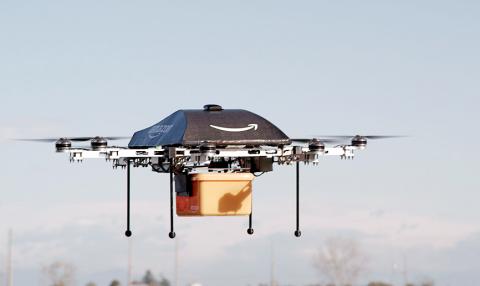Amazon CEO Jeff Bezos revealed on Sunday that his company is looking to the future with plans to use “octocopter” mini-drones to fly small packages to consumers in just 30 minutes.
The US retail giant’s ambitious project still requires more safety testing and federal approval, but Bezos estimated that Amazon “Prime Air” would be up and running within four to five years.
A demo video posted on the company’s Web site showed the tiny robotic devices picking up packages in small yellow buckets from Amazon’s fulfillment centers and then whizzing through the air to deliver the items to customers just 30 minutes after they made their purchase on Amazon.com.

Photo: AFP
“I know this looks like science fiction. It’s not,” Bezos told CBS television’s 60 Minutes program.
“We can do half-hour delivery... and we can carry objects, we think, up to five pounds [2.3kg], which covers 86 percent of the items that we deliver,” he said.
The mini-drones are powered by electric motors and could cover areas within a 16km radius of fulfillment centers, thus covering a significant portion of the population in urban areas. They operate autonomously and drop the items at the target locations thanks to GPS coordinates transmitted to them.
“It’s very green, it’s better than driving trucks around,” Bezos said.
Amazon said the octocopters would be “ready to enter commercial operations as soon as the necessary regulations are in place,” adding that the US Federal Aviation Administration (FAA) was working on rules for unmanned aerial vehicles. It projected a more optimistic timeline than Bezos himself for the project to be activated, saying the FAA’s rules could be in place as early as 2015 and that Amazon Prime Air would be ready at that time.
Bezos hinted that part of the motivation behind the mini-drones was to make sure Amazon remains on the cutting edge of the retail industry.
“Companies have short life spans... And Amazon will be disrupted one day,” he said. “I would love for it to be after I’m dead.”

With an approval rating of just two percent, Peruvian President Dina Boluarte might be the world’s most unpopular leader, according to pollsters. Protests greeted her rise to power 29 months ago, and have marked her entire term — joined by assorted scandals, investigations, controversies and a surge in gang violence. The 63-year-old is the target of a dozen probes, including for her alleged failure to declare gifts of luxury jewels and watches, a scandal inevitably dubbed “Rolexgate.” She is also under the microscope for a two-week undeclared absence for nose surgery — which she insists was medical, not cosmetic — and is

CAUTIOUS RECOVERY: While the manufacturing sector returned to growth amid the US-China trade truce, firms remain wary as uncertainty clouds the outlook, the CIER said The local manufacturing sector returned to expansion last month, as the official purchasing managers’ index (PMI) rose 2.1 points to 51.0, driven by a temporary easing in US-China trade tensions, the Chung-Hua Institution for Economic Research (CIER, 中華經濟研究院) said yesterday. The PMI gauges the health of the manufacturing industry, with readings above 50 indicating expansion and those below 50 signaling contraction. “Firms are not as pessimistic as they were in April, but they remain far from optimistic,” CIER president Lien Hsien-ming (連賢明) said at a news conference. The full impact of US tariff decisions is unlikely to become clear until later this month

GROWING CONCERN: Some senior Trump administration officials opposed the UAE expansion over fears that another TSMC project could jeopardize its US investment Taiwan Semiconductor Manufacturing Co (TSMC, 台積電) is evaluating building an advanced production facility in the United Arab Emirates (UAE) and has discussed the possibility with officials in US President Donald Trump’s administration, people familiar with the matter said, in a potentially major bet on the Middle East that would only come to fruition with Washington’s approval. The company has had multiple meetings in the past few months with US Special Envoy to the Middle East Steve Witkoff and officials from MGX, an influential investment vehicle overseen by the UAE president’s brother, the people said. The conversations are a continuation of talks that

CHIP DUTIES: TSMC said it voiced its concerns to Washington about tariffs, telling the US commerce department that it wants ‘fair treatment’ to protect its competitiveness Taiwan Semiconductor Manufacturing Co (TSMC, 台積電) yesterday reiterated robust business prospects for this year as strong artificial intelligence (AI) chip demand from Nvidia Corp and other customers would absorb the impacts of US tariffs. “The impact of tariffs would be indirect, as the custom tax is the importers’ responsibility, not the exporters,” TSMC chairman and chief executive officer C.C. Wei (魏哲家) said at the chipmaker’s annual shareholders’ meeting in Hsinchu City. TSMC’s business could be affected if people become reluctant to buy electronics due to inflated prices, Wei said. In addition, the chipmaker has voiced its concern to the US Department of Commerce